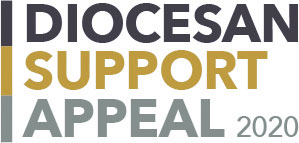CHARLOTTE — Thirteen deacon candidates for the permanent diaconate and their instructors have had to adjust to virtual formation during the COVID-19 pandemic. The closure of churches, parish activity and retreat centers over the course of several months meant classes had to be conducted remotely in order to keep the men on track for a scheduled 2021 ordination.
In addition to meetings via video conferencing software, the candidates are continuing their online classes through the University of Notre Dame in addition to their other assignments for formation, said Deacon Ed Konarski, who has been assisting with formation.
“With the good spirit and cooperation of the teachers, and the candidates and their wives, the current year has been completed as planned. Going forward, we will continue the process of formation in this fashion until we are able to meet in person,” Deacon Konarski said.
He acknowledged that they have missed the personal encounters, discussions and interactions with the candidates due to public health restrictions that until recently prohibited in-person meetings and trainings. Not being able to pray together or participate together at Mass has been unfortunate, he added.
Your DSA contributions at work
The Permanent Diaconate Program is funded by the annual Diocesan Support Appeal. For more information or to donate, go online www.charlottediocese.org/dsa.
But, he noted, the physical separation has enhanced the importance of the men’s own personal spiritual practices. “Despite these losses, we trust that the current situation is somehow an important part of the men’s formation in order for them to become the deacons God intends for them to be,” he said.
Deacon Ruben Tamayo of St. Vincent de Paul Church in Charlotte helped facilitate in-person sessions as well as the last remote session the candidates had in May.
“The remote learning still allows for some level of interaction and makes it possible to continue the classes when on-site classes are not feasible,” he said. “I can see this class format remaining useful beyond the pandemic. For example, we can avoid canceling classes due to inclement weather such as snow and ice.”
Deacon Tamayo said the candidates will still need “same time, same place instruction to allow the candidates and their wives to develop a sense of community – something that has been very helpful to my classmates and our wives.”
“Yes, the pandemic has been a challenge for formation, but our leaders in formation have modeled responsible, responsive and reflective adaptation to the changing and evolving situation,” said candidate John Langlois. “These alone are valuable examples and lessons that we will all be able to bring forward in our ministry, God willing, as future deacons.”
The candidates are scheduled to be instituted as acolytes on Aug. 15, another step forward in their formation journey.
— SueAnn Howell, Senior reporter



